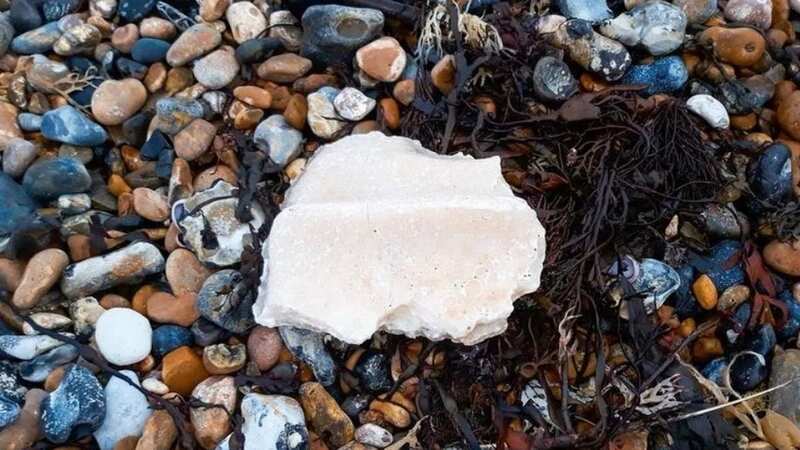Warning over 'fatbergs' deadly to dogs amid sightings as Storm Agnes approaches

Dogwalkers have been warned over the deadly dangers posed to their dogs by 'fatbergs' ahead of Storm Agnes after they were spotted on UK beaches.
A substance thought to be palm oil was found at three different locations on the Adur and Worthing coastline in West Sussex earlier this week, according to Worthing Borough Council. The clumps of semi-solid material were found on the seafront in Beach Parade, at Windsor Lawns in Worthing, and next to Perch on Lancing beach. Around 20 bags of the substance have been removed, and one of the 'fatbergs' discovered along the shore weighed over 13 pounds (6kg), according to a local environmental group.
Palm oil is often used in food manufacturing and beauty products, and is not harmful to humans - but can be deadly if ingested by canines.
 Palm oil can appear in dark, yellowish or white waxy blocks when washed ashore, and is dangerous to dogs (Adur District Council)
Palm oil can appear in dark, yellowish or white waxy blocks when washed ashore, and is dangerous to dogs (Adur District Council)It comes amid fears that more fatbergs could appear in the days ahead as Storm Agnes batters the British Isles, with wind speeds forecast to hit 80mph in some areas. When washed up on a beach, palm oil can appear in dark, yellowish or white waxy blocks. It can legally be released by ships into the sea if they are at least 12 nautical miles from the shore, but occasionally makes its way onto land. It can appear to have the same consistency as candle wax with a putrid diesel scent, and is known to pick up bacteria while in the water.
For dogs, palm oil can cause blockages in the digestive system, though much of the risk posed by the waxy beach deposits is thought to come from it mixing with other substances upon its ejection from vessels, such as diesel oil. Anyone who believes their dog may have ingested it should take them to a vet immediately. Earlier this year, a three-year-old dog died after eating what was understood to be dark-coloured palm oil on a Welsh beach. Pembrokeshire Council said it had received reports of the incident at Newgale beach on June 8, and asked beach users to keep dogs on leads and away from the substance.
 'Half-moon' shape seen in eye could signal condition leading to a heart attack
'Half-moon' shape seen in eye could signal condition leading to a heart attack
No deaths of pets have been reported in West Sussex, and the substance has not yet been confirmed as palm oil. The Mirror have approached the Environment Agency, who are carrying out tests, for comment. A spokesperson for Worthing Council said on social media: "The Environment Agency is investigating after what is believed to be palm oil was found along the Adur and Worthing coastline yesterday. A substance was discovered at three locations on the seafront opposite East Beach Studios in Beach Parade and at Windsor Lawns in Worthing, as well as by Perch on Lancing beach.
"Our coastal warden team coordinated with the waste team to have it removed and the Environment Agency is due to take a sample of the substance today. The area will be monitored over the next couple of days. Palm oil can get into the marine environment when it is legally released at sea by ships when vessels wash out their tanks."
"The resulting substances are often mixed with other chemicals such as diesel, making it extremely harmful if ingested. Washed up onto the beach, palm oil is white and waxy in appearance and can range in a variety of sizes from pebble sized, semi-solid lumps to larger blocks and can smell of diesel. Dog owners in Adur and Worthing are being advised to be cautious when walking their pets on the beach. If they suspect their pet has eaten any of the substance they should go to the vets immediately. If anyone spots what they think could be palm oil then they can contact the Coastal Office on 01903238977."
Read more similar news:
Comments:
comments powered by Disqus

































